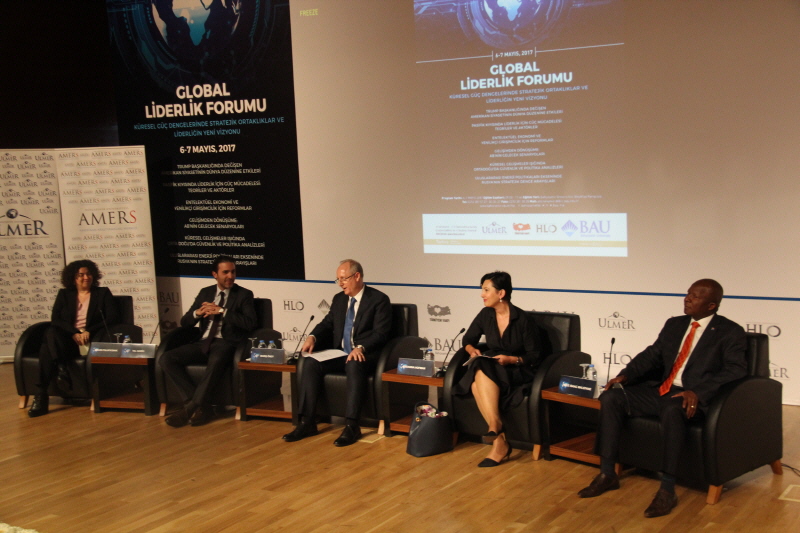Mayıs 2017
Bahçeşehir Üniversitesi Global Liderlik Forumu, 6 Mayıs 2017
INTELLECTUAL ECONOMY AND REFORMS FOR INNOVATIVE ENTREPRENEURSHIP
Barış Öney moderated the Intellectual Economy and Reforms for Innovative Entrepreneurship Panel at the Bahçeşehir University Global Leadership Forum. The panelists were Ms. Joanna Hofman, Vice President, Corporate relations and International Affairs at Fortum Corporation; Mr. Tal Garih, Energy, Business Development Manager; Ms. Melek Pulatkonak, Founder of the Turkish Women’s International Network and Pule Isaac Malefane, South Africa’s Ambassador to Turkey.
The panelists approached the subject from their experiences and know-how in how the world is shaping and will shed light on general topics as well as examples from various angles including from their respective countries.
The panel began with Öney’s opening speech and he introduced the panelists and himself to the audience. After the introduction panelists shared their opinions about economy, reforms, innovation and entrepreneurship.
Some highlights from the panelists’ speeches;
Joanna Hofman
Innovation is exploding with new ideas, processes and services. But the important thing is bringing them to the market.Innovation improves quality.
Innovation leads to wealth creation.Innovative ideas will separate you from the rest.Innovation also means improvement.
Innovation & creativity work hand in hand.Education is not about money, it is about the people.Growth is generated by innovative entrepreneurs.
Data without analysis is nothing. But by analysing data, businesses are trying to become smarter.It is not just scientists who innovate. It is also the entrepreneurs.
Entrepreneurs should follow the trends.Competition is important. It stimulates innovation.
Tal Garih
Turkey’s strength lies in its youth.
It is all about the ecosystem and business models.
We are living in a world where disrupters are being disrupted.
Products are becoming smarter.
Focusing on user experiences and security.
It is important to build a collective interest base.
There are 4 important principles; 1. Collaboration
2. Transparency
3. Sharing
4. Empowerment
In business life there will be leadership but there will be no one leader.
Future will bring singularity.
Imagination is important.
Melek Pulatkonak
It is all about people. We need diversity.
45% of jobs will go out by 2030. 76% of workforce in 2020 will be millennials.
Companies need to know millennials better.
Universities are great places for diversity. You meet different people in universities. This is a great place to explore your ventures.
In Turkey, we need to focus on changing the culture
Pule Isaac Malefane
We need human interaction for innovation.
That is possible only in a free economy.
Diplomats don’t have the liberty to share opinions freely.
Youth is important.
Politics of digital divide is far from over.
South Africa’s achievements in science and technology were important.
Exports go cheap, imports come expensive.
Innovation is essential to change it.
Turkey’s vision 2023 also encompasses technology, R&D and innovation.
There should be coopetition, not competition. For example; we need to cooperate for global warming in the world.
Finished the speech with Mustafa Kemal Atatürk’s words: Mankind is a single body and each nation a part of that body. We must never say “what does it matter to me if some part of the world is ailing?” If there is such an illness, we must concern ourselves with it as though we were having that illness.
Barış Öney
The current situation in the world, politics are heating up yet there is abundance of funds floating around looking for investment opportunities
Global Growth Cities (Jakarta, Istanbul, Mexico City etc.), 2/3rds of world’s GDP and 3/4ths of global growth will come from these cities
Investments are expected to go to some key sectors such as:
- Infrastructure and energy investments
- Innovative Technology, especially Artificial Intelligence
- Financial and business services
- Health care
According to a research done by McKinsey in late 2015, across all global corporations from 1980 to 2013, EBITs increased more than 3x; net incomes 5x
Emerging economies are now expanding globally, in part through aggressive M&A strategies.
In 1990, there were 11,500 M&A deals a year. Since 2008, there have been some 30,000 deals a year.
The tech sector, in particular, has seen a wave of M&A activity as larger players use acquisitions to expand their portfolios and stay on the cutting edge. When Facebook acquired Instagram in 2012, for instance, it paid $1 billion—or $30 for each of the service’s 33 million users. Just two years later, the company acquired WhatsApp for $19 billion.
It is obvious that Firms with vision who could utilize intellectual capital and allow for innovative entrepreneurship within their organizations (or intrapreneurship) can realize enormous opportunities.
Large firms attempt to stay on the cutting edge by holding competitions and “hackathons,” or by partnering with venture capital firms to be their eyes and ears. Others have established their own accelerators and VC funds to carve out a role in the entrepreneurial ecosystem.
Acquisitions can be a key part of an innovation strategy, but winning with M&A requires being selective and purposeful. Even without making an acquisition, companies can form smart alliances with firms in other sectors for quick access to new capabilities and markets.




